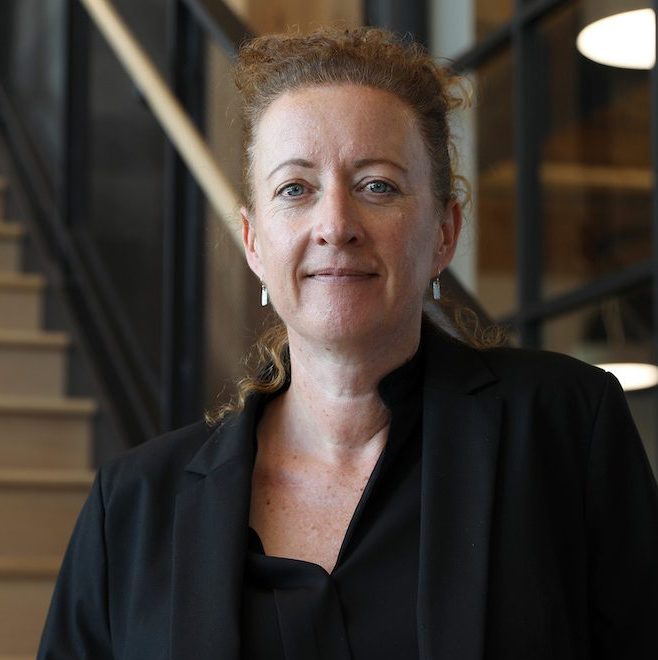
The new head of public safety at the University of Southern Maine isn’t big on formalities. Sure, she’ll answer to “chief.” But Gráinne Perkins prefers to go by her first name, even if that means once again explaining how to say it properly.
“It’s an Irish name,” Perkins said with an equally Irish accent. “The English, in their wisdom, tried to anglicize it and call it Grace. But anyone who’s met me knows I’m a lot of things, but I’m not a Grace.”
Gráinne Perkins began work as USM’s Chief of Police on March 13, less than two months before graduation. The freshmen who arrived on campus in August are the first class that she will see through a full academic year. Like those students, she’s still getting familiar with her new community.
Introductions usually start with a lesson in Irish pronunciation. Gráinne rhymes with the more typically American name Tonya. No such lesson was necessary at the Osher School of Music. Perkins was surprised when the staff recognized her name from the title of a 1989 stage play at Russell Hall in Gorham.
“Grannia” was a musical production about a female pirate who sailed along the western Irish coast in the 16th century. The real-life inspiration for the show was Gráinne Ní Mháille or, as the English called her, Grace O’Malley. Perkins claims her as a distant relative.
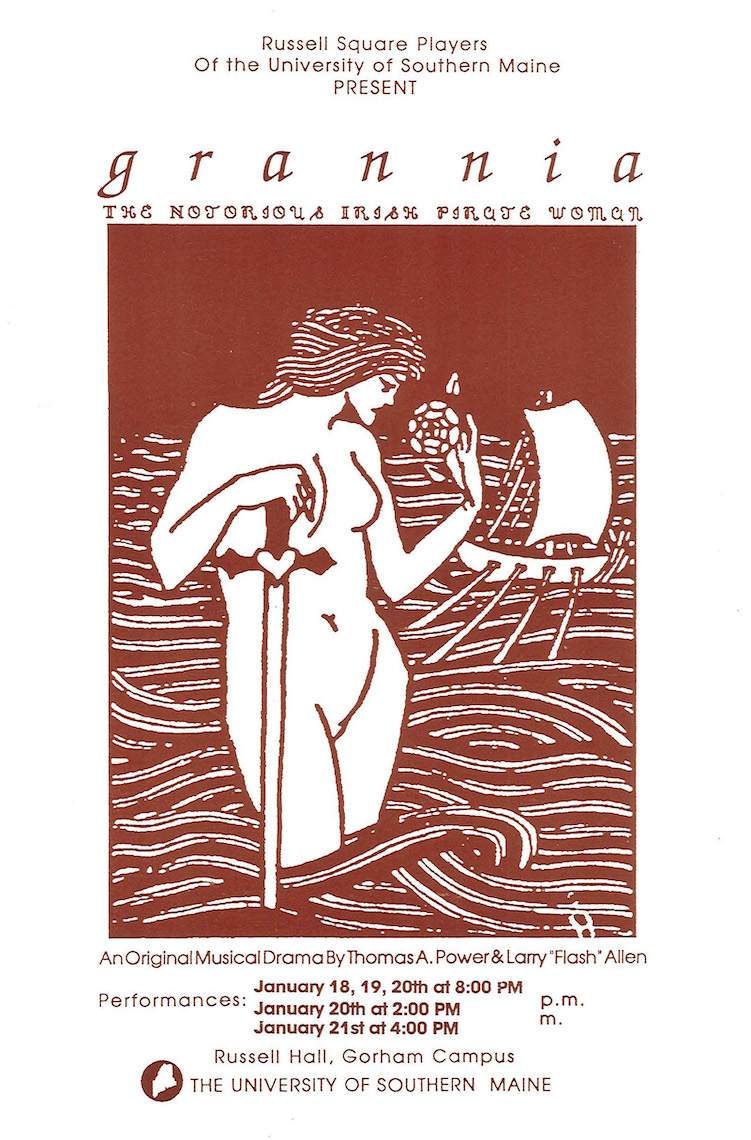
Perkins’ personal history begins in Dublin, where she was born and raised. A keen sense of responsibility helped her stand out in a raucous household with five siblings. As the middle child, Perkins often acted as mediator. Her parents often relied on her to watch over the other kids despite not being the oldest.
“I’m not by any way maternal, but I’m good in difficult situations,” Perkins said. “I’m not what we would call a ‘flapper.’ I don’t lose the head. I’m better when things are tough because I think straighter.”
While many of her siblings pursued careers in health care, Perkins gravitated to law enforcement. However, the Irish police service wasn’t recruiting new officers at the time she entered college. Looking for an edge, she attended a lecture by the leader of Ireland’s forensic science department. The speech opened her eyes to science as a pathway to policing.
Chemistry and lab work held no appeal. Instead, Perkins would establish her scientific bona fides by earning an undergraduate degree in zoology. Her plan worked. After a few months on a wait list, the police service called with a job offer. But her education didn’t end there. Perkins would earn two master’s degrees while working her way up the ranks.
The arc of Perkins’ career went from community police officer to narcotics investigator to homicide detective. Adding to her workload, she also served as Interpol’s liaison in Ireland. She had just been promoted to detective sergeant when her upward trajectory took a sudden detour.
Perkins’ husband, Chris, worked for Amazon. The company offered him an exciting opportunity, but it meant moving to Cape Town in South Africa. The choice made Perkins rethink her own career. While she’d been successful, her growing administrative duties made her restless. At 39 years old, she decided to start over.
A former professor helped Perkins with the transition to life in South Africa by putting in a good word for her at the University of Cape Town. She dove into the PhD program for Criminology. Her studies focused on the high murder rate of police officers.
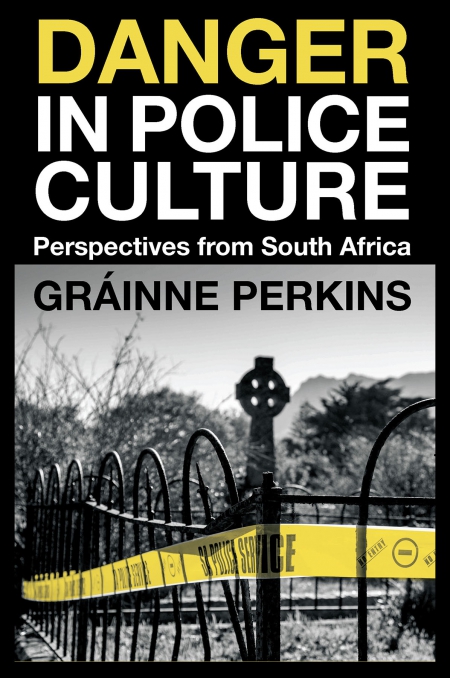
For five years, Perkins accompanied officers to crime scenes to assess the dangers they faced and identify safer alternatives. The idea of restorative justice, by which victims and offenders come together to work out their conflicts, played a big part in that effort.
“The educational component, it has to become a core part of police work,” Perkins said. “The understanding of Sociology, Anthropology, Criminology, that’s the nuts and bolts of what policing is: understanding people. And I think the theory behind a lot of what I studied is the framework; it’s the architectural framework of why and how we do what we do.”
The research that Perkins gathered became the basis for her upcoming book, “Danger in Police Culture: Perspectives from South Africa.” Digital copies will be available in December and the printed version will come out in January.
Not long after Perkins earned her doctorate, Amazon came calling again with another offer for Chris. The two of them once more packed their bags for another move, this time to Seattle. A community forum on policing seemed to Perkins like a good way to learn more about her new home. The contacts she made there led to her next job with the city police.
As the Interim Director of the Office of Police Accountability, Perkins handled complaints against the department and its members. She expected to stay busy in a city with more than 700,000 residents. But she couldn’t have predicted how busy her job would become.
Perkins was still new to the city when the first cases of COVID-19 broke out. Seattle soon became a major entry point for the spread of the virus into the rest of the country. The surge in cases put a strain on all emergency services.
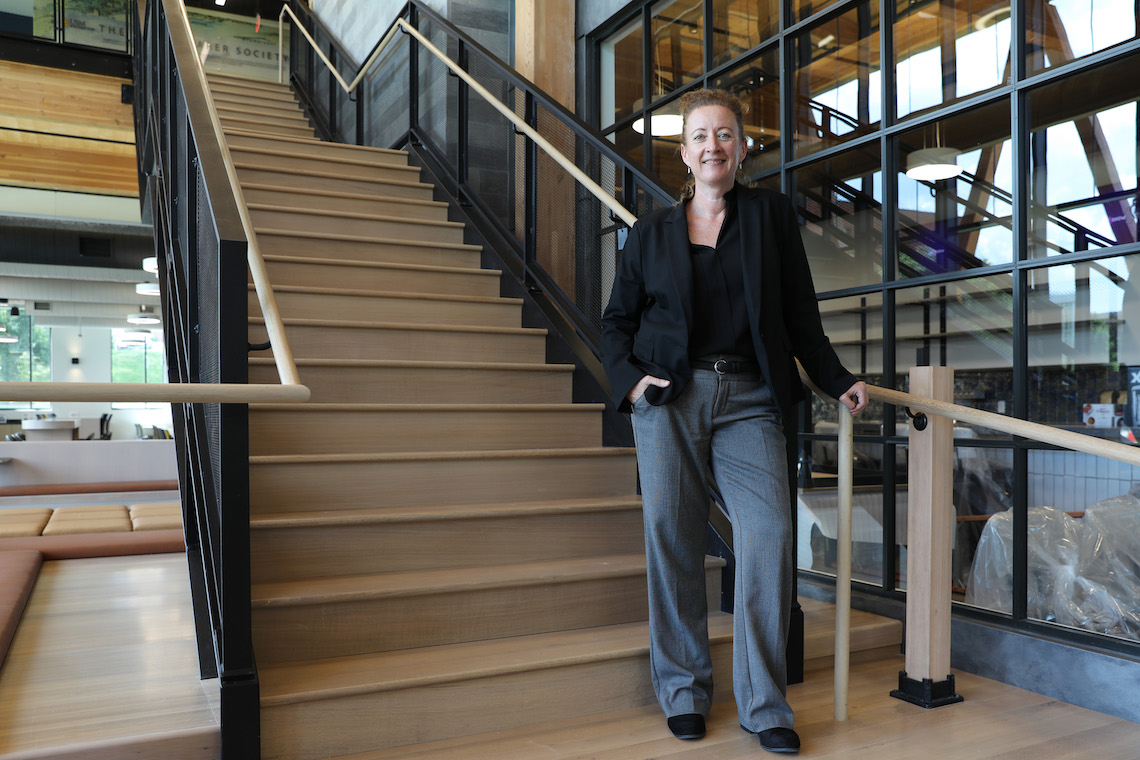
The public was appreciative of police in the early days of the pandemic. But feelings soured a few months later when the death of George Floyd at the hands of Minneapolis police officers sparked nationwide outrage. Protests over police tactics aimed at people of color flared through the summer of 2020.
When Perkins started her job, she fielded about 30 complaints a week. During the height of the protests, the weekly tally of complaints numbered in the thousands. Perkins relied on the organizational skills that she honed as a researcher to process all of them. That level of intensity is only sustainable for so long, and after three years, Perkins reached her limit.
The USM opening offered the change Perkins wanted with a return to community-level policing. The university setting would allow her to pursue her academic interests. And an east coast address made the trip to Ireland much easier for family reunions. Her in-laws were even closer in New Hampshire. The final consideration fell into place when Amazon granted Chris a transfer.
Upon arriving on campus, Perkins took stock of her new workplace. She gave credit to her predecessors, former Chief Ronald Saindon and Captain Timothy Farwell who served as interim chief, for leaving the department in good shape. Perkins wants to build on their work by strengthening relationships both individually and institutionally.
“It has to get back to that, the core function of policing, which is it’s relational,” Perkins said. “It’s about chatting to people. And I think that’s, for me, the attraction. It’s that one-to-one contact with people. That’s the thing I enjoy the most.”
Perkins builds trust by taking an interest in campus life. She has visited student drag shows, a Passover seder, and Ramadan observances. Perkins sees her advocacy for public safety awareness as part of the University’s educational mission. The tips students learn from her can add to their quality of life as much as their classroom lesson.
Perkins’ outreach extends beyond campus to other area police agencies. She compares notes with fellow chiefs and sheriffs on the shared challenges they face, like staffing shortages. The USM Police has openings for a sergeant and two officers.
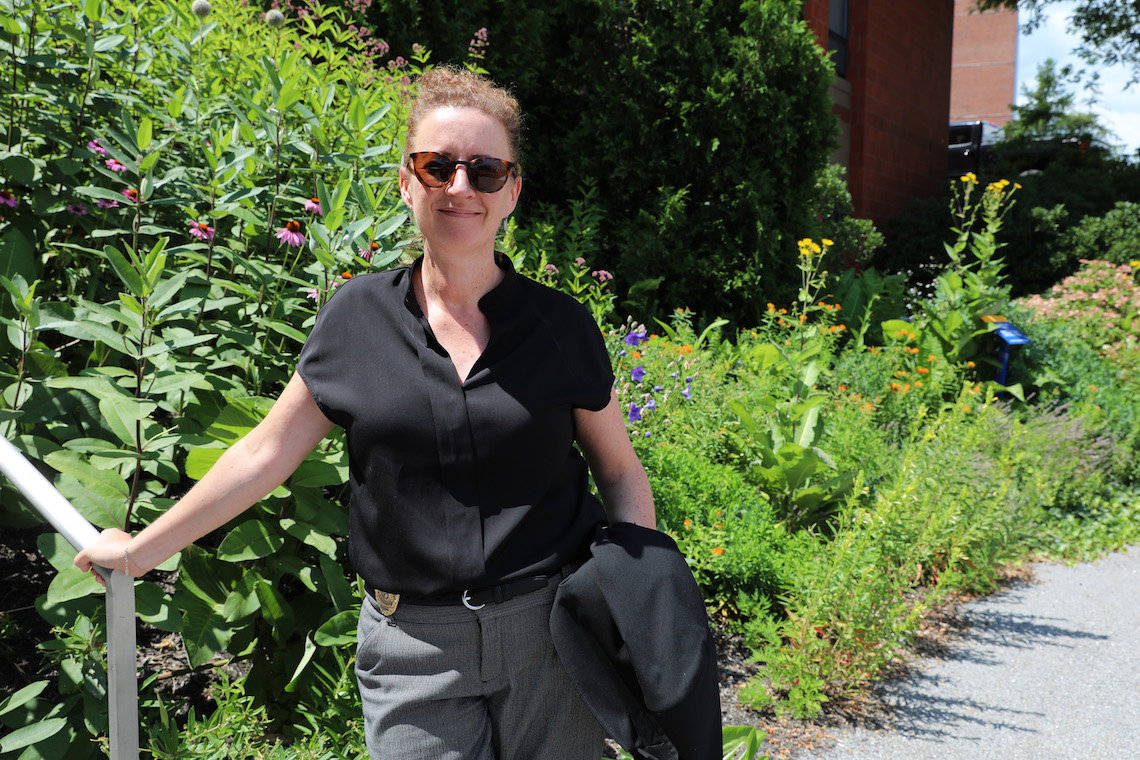
Local media also wanted to tap into Perkins’ expertise about police recruiting. She gave several interviews over the summer about the 30×30 Initiative, a national program aimed at increasing the percentage of women in law enforcement. Perkins’ insights carried the weight of personal experience.
“I’ve never felt a suppression in anything I’ve tried to do. It’s been encouraged,” Perkins said. “But I definitely think it takes a certain type of personality with respect to knowing what you want and going after it. And ignore the boundaries and the lines that society says, ‘Maybe you should stay between these.’”
When she’s not on duty, Perkins likes to keep in shape by running. And she’s looking forward to testing the recreational possibilities of her first full Maine winter. Her competitive drive even landed her in the Guinness Book of World Records. As a college student, she was part of two teams that set records for tallest free-standing pyramid of soda cans and longest paper chain.
Perkins is happy to share more about herself over a cup of coffee. She’s well known at the cafés around campus. And when her order is ready, the staff is getting better about properly pronouncing the name on the side of her cup.

